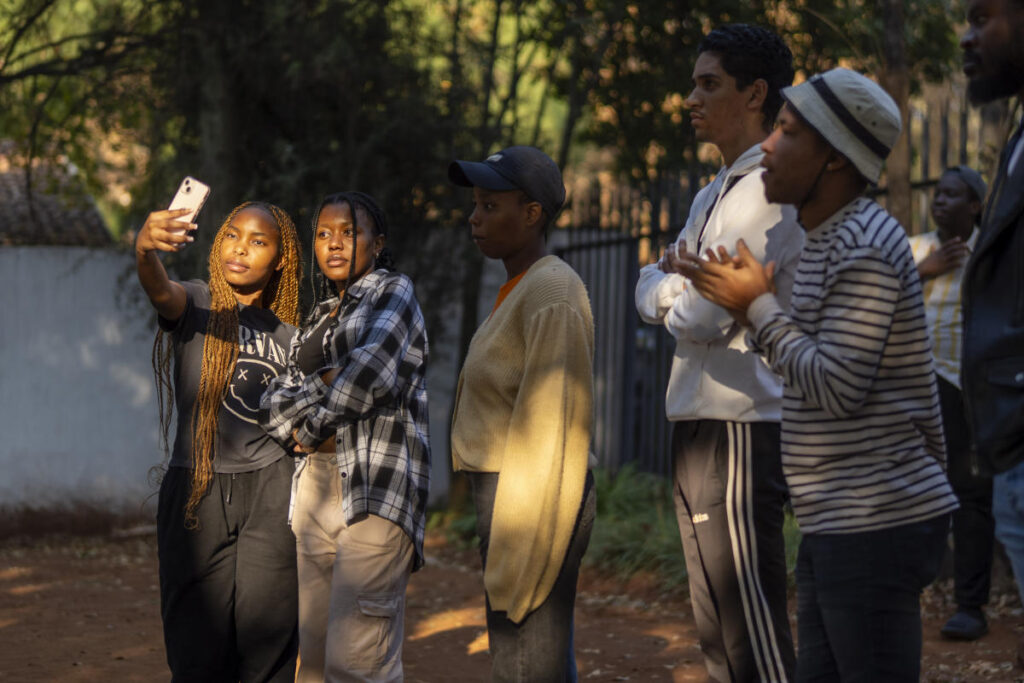NKANDLA, South Africa (AP) — Months ahead South African elections20-year-old Amahle Ncane and her friends decided to turn peer pressure on its head and made their own special pact: unlike their parents’ lost dreams after the high expectations of the first democratic elections in 1994 they will keep theirs alive through the vote.
On election day On Wednesday, voters flocked for the first time, as a group, to the Ntolwane Primary School polling station in Nkandla, a rural area in the eastern province of KwaZulu-Natal.
Outside the dusty school building in the mountainous and picturesque area, they hugged each other, danced and sang “we are fearless.” Joining them was 56-year-old Sigcino Mfundisi Thusi. “I was also a first-time voter in 1994,” he told them, referring to the defining vote on the first race that ended the white minority regime of apartheid 30 years ago. He then spoke of the despondency that later crept in because of unfulfilled promises high unemploymentcorruption and poor service.
“I’m sure our parents danced like that in 1994, but they’re still miserable. I don’t want to be like them, our dreams can’t be put on hold,” young Ncane replied as her friends shouted in agreement.
Aldusi and the girls laughed off the jibes, but the conversation highlighted how young South Africans, unlike the older generation, are determined to make their votes count and their dreams become reality in a country where youth poverty is a hallmark of unfulfilled post-crises. apartheid ambitions. Many young people have seen it this election as the most important since the end of apartheid, with several opinion polls putting the ruling African National Congress party’s support at less than 50% before this vote, amid the frustrations.
“My vote today means a lot because there is so much we still hope for,” Ncane said later.
The problems they have to solve are palpable. The official unemployment rate in South Africa stands at 32%, with the number of unemployed rising from 5.1 million in 2014 to 8.2 million this year, according to official figures.
Young people are the hardest hit, according to the latest labor survey published by the country’s statistical office two weeks before the elections.
Between the last quarter of 2023 and the first quarter of 2024, the number of unemployed young people increased by 236,000 to 4.9 million, the study said.
Ncane was born ten years after South Africa’s liberation from apartheid. She has heard stories from her parents about how they survived apartheid, celebrated when they were first allowed to vote in 1994 before despair took over.
The desperation had endangered South Africa’s young democracy as despondency led both young and old to stay away from the polls in the elections following the historic 1994 vote.
Voter turnout, which was almost 87% in 1994, has fallen to 66% in recent years. 2019 general elections.
The figure fell to just over 45% in the 2021 local government elections, according to German think tank Konrad Adenauer Foundation, which has offices in South Africa.
Young people, who make up the majority of South Africa’s 60 million people, seemed less willing to participate in those elections.
The report noted that of approximately 1.8 million of 18-19 year olds eligible to vote in the election, 90% had not registered. Less than 20% of people aged 20 to 35 have registered to vote, compared to more than 90% of the population aged 40, according to the report, which blames the reasons for not voting in part on “ insufficient changes in people’s own personal circumstances.”
But Ncane saw conditions changing in her rural community. Many young people, unable to find jobs and educational opportunities, turned to drugs and crime, vices previously largely associated with urban areas.
Despite being high school students, Ncane and her group of friends decided to bring about positive change among their peers by going around the village and urging their peers to register as voters.
“Young people don’t see a future, so it’s our job to convince them that they have a chance to influence the future they want. We are trying to give them the confidence to vote,” she said.
More than 27 million people have registered to vote, the highest number since the arrival of democracy in the country. More than 40% of them are between 18 and 39 years old, according to the country’s election administration, thanks to campaigns by the government, political parties and young people like Ncane.
“After the 1994 elections in South Africa, voters under the age of 25 no longer participated in the same way as other age groups. Many parties saw this year as an opportunity to change that,” said Christopher Stone, a professor at Oxford University’s Blavatnik School of Government, who has been closely watching the election.
Figures on late voter registration were more telling. When the country’s election management body announced a period for a round of late voter registration over a weekend in November last year, nearly 80% of the first registrations were of people under the age of 29, the country’s election management body said.
It’s a trend that Ncane, who plans to study politics after high school, wants to continue.
“I don’t care what their political preferences are, I just want young people to vote,” she said as she went home with her friends to wait for the election results.
___







